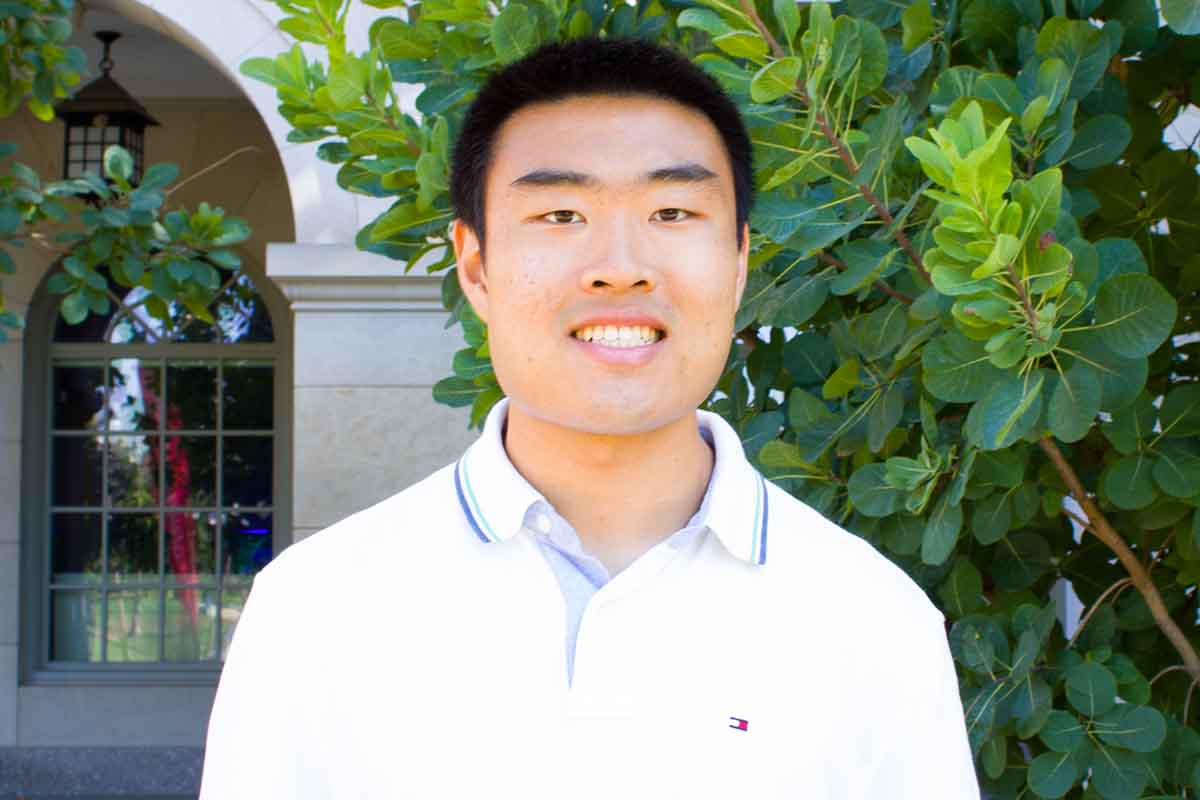Brian Sun
Electrical & Systems Engineering
Degree pursuing: PhD in Electrical Engineering

Where did you complete your undergraduate degree?
Washington University in St. Louis
Please provide your lab and description of research.
I am an MD/PhD student in the Lew Lab, which builds advanced imaging systems to study nanoscale biological and chemical dynamics. I create hardware, software, and fluorescent probes to investigate how the conformations of biological structures (e.g. viral surface proteins, amyloid-beta fibrils) affect their biophysical properties and interactions. My goal is to understand how these conformational dynamics modulate disease formation and cell responses to infection.
Did you participate in summer research prior to your graduate degree? If so, when and where did you complete your research?
I worked with Professor Lew to correlate the structural dynamics of amyloid-beta (A-beta), a biomarker of Alzheimer's disease, with its large-scale remodeling using single-molecule orientation localization microscopy. A-beta's underlying beta-sheet structure is known to influence how it grows and decays, but the exact mechanism is unclear to biomedical scientists. By tracking the orientations of the beta-sheet structures over time during growth and decay, we clarified relationships between A-beta's nanoscale organization and remodeling invisible to diffraction-limited imaging techniques.
What played into your decision to get a graduate engineering degree?
When I was a preclinical-phase MD/PhD student, several biologists and clinicians remarked that limited imaging capabilities, not ideas, prevented them from exploring the scientific questions they found interesting. My time in the classroom, clinic, and rotation labs sparked my interest in graduate training that prepared me to not only rigorously ponder these questions but invent the tools that could investigate them. Pursuing a Ph.D. in Electrical Engineering will prepare me to do both.
Why did you pick WashU?
Being at a biomedical research powerhouse like WashU is highly advantageous if you want to do science and medicine. Research funding? No problem. Want to collaborate with a world expert in a certain research field or clinical specialty? Depending on the field in question, they're probably right down the hall from you! As someone interested in becoming a physician-scientist, WashU MSTP's 50+ year history of successfully training and mentoring MD/PhD graduates in academia and industry also proved highly attractive. This wealth of resources, combined with how much I enjoyed my time as a WashU undergrad, made staying for MD/PhD training an easy choice.
What is your favorite thing about St. Louis?
Forest Park single-handedly buoys my mental and physical health as a WashU student. It's beautiful all year (especially in the Spring) with trails, bike paths, and sidewalks winding through every corner of the park, contains plenty of open space to do outdoorsy stuff, and houses several great attractions you can visit for free throughout the year (Science Center, Zoo, Art Museum, History Museum, Jewel Box, Muny). As someone who likes to run, I've logged too many miles to count in Forest Park and am still not tired of it. We're incredibly fortunate that it's practically at the doorstep of both the Medical and Danforth campuses.
What advice would you give to a new student?
Research is an enterprise where you'll always feel like there's more stuff you need to do. It's really easy to convince yourself to stay late in lab or bring home work with you unnecessarily, especially if you've been swimming in negative results or failed experiments.
To this end, I think the most useful thing you can practice doing as a graduate student, if you haven't already done so, is setting boundaries between your academic and personal life by scheduling fun things to look forward to. One of my friends loves to play the piano and draw, and another friend likes to play video games and hit the gym. I make sure I have time every week to run and play table tennis. Anything goes! You're most enthusiastic about science and do your best work when you're happy and healthy, so whatever helps you take your mind off work is great to have.
What campus activities or groups would you recommend to a new student?
SPECTRA (WashU's Optical Society of America (OSA) and SPIE student chapter) is a good community to join if you're interested in anything related to optical sciences or imaging. SPECTRA hosts a Math Crash Course every summer to give students a chance to brush up on math and meet their future classmates, an annual Fall conference with both student and faculty programming, and social events celebrating academic year milestones (e.g.) end-of-summer picnic and end-of-semester socials, among other things. As a student group whose main purpose is to build community, I think SPECTRA does a great job. If you're someone who enjoys sports or otherwise being active, I'm also a big supporter of graduate students participating in intramural or club sports. I play table tennis as a member of WashU Table Tennis, and it's been a great way to make friends with WashU students from outside my lab and department. My classmates who participate in other sports have also loved the chance to explore outside their academic bubble and stay healthy at the same time.
What are your plans for the future?
For now, my goal as a PhD student is to learn how to do good science and communicate it to a wide range of audiences. I'll return to medical school after my thesis defense to finish clerkships, take additional clinical electives, and determine what specialty interests me the most clinically and scientifically. After graduating from MD/PhD training, I hope I can pursue a research-track residency that prepares me to both see patients and do research as a physician-scientist in any setting that welcomes science and medicine.
